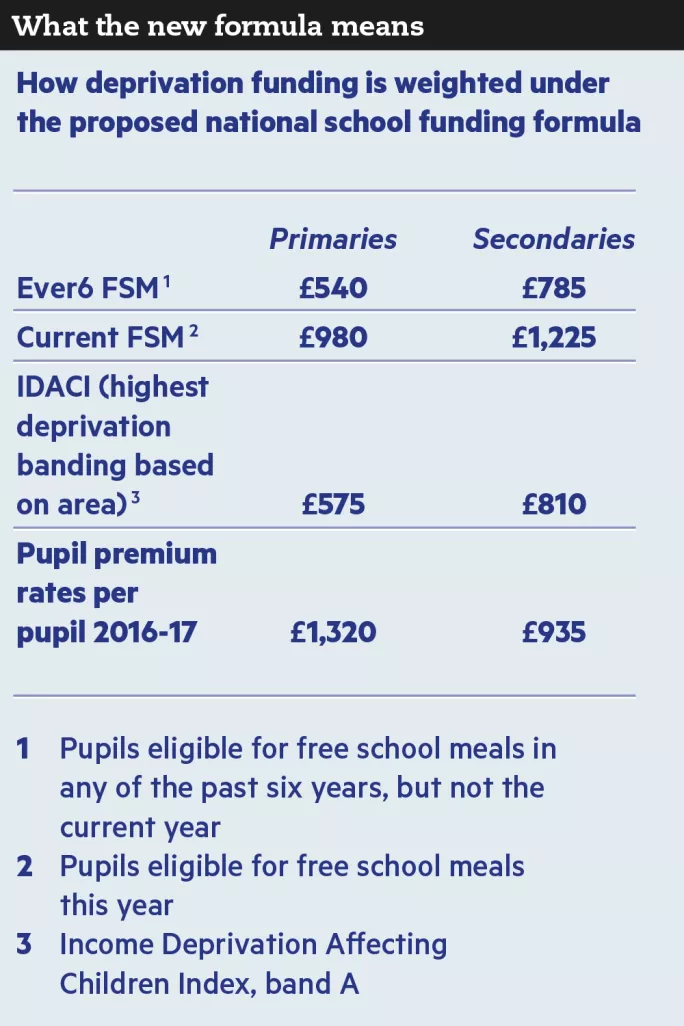Cash for deprived pupils is way off target, experts say

School funding plans contradict research evidence by dramatically skewing extra money for deprived pupils towards secondaries, rather than primaries, TES can reveal.
The move has been condemned by headteachers, union leaders and the chief executive of a major government-funded education research organisation.
Studies have shown that disadvantaged pupils are more likely to catch up with their peers if extra funding is provided as early as possible in their education. But TES analysis reveals that the government’s proposed national school funding formula would fund deprived pupils in secondaries at a rate that is nearly a third higher than in primaries.
The change would more than cancel out the £385 of extra pupil premium money that primary school pupils currently receive compared with their secondary counterparts.
Sir Kevan Collins is chief executive of the Education Endowment Foundation, set up with £125 million of government money to find the most cost-effective way of breaking the link between family income and educational achievement. He said the formula should have weighted deprivation-related funding towards primary schools instead.
“A shift or rebalance in funding [towards] secondaries is worrying because it means that we’re trying to catch up, rather than investing early,” Sir Kevan warned.
A shift or rebalance in funding towards secondaries is worrying
Research showed that investing earlier on in a child’s school life was the best way to close the attainment gap, he added. Ideally, funding would swing towards early years education.
Under the pupil premium, primary pupils who are, or have been, eligible for free school meals attract £1,320 each, reduced to £935 for those in secondary schools.
Boost ‘wiped out’
But TES analysis of the new funding formula figures shows that a secondary school pupil currently eligible for free school meals, living in one of the most deprived areas of England (according to the IDACI index), would attract 31 per cent - or £480 - more in deprivation funding than if they were at a primary school.

Valentine Mulholland, head of policy at the NAHT headteachers’ union, said: “We are surprised that while the government accepts that primary schools need a higher level of pupil premium than secondary schools to close the attainment gap…they’re taking exactly the opposite approach and wiping out that pupil premium differential in the process.”
Funding associated with deprivation should generally be weighted towards the earlier years of education “because that’s where it can make the most difference”, she added.
Kevin Courtney, general secretary of the NUT teaching union, agreed. “The evidence shows that the earlier schools intervene to address the attainment gap for children from deprived families, the more effective the intervention is,” he said.
The earlier schools intervene to close the gap, the more effective it is
The national funding formula consultation document says that the decision to weight deprivation money towards secondaries “reflects on our decision on the overall primary to secondary ratio, as well as typical local authority practice”.
But John Coe, of the National Association for Primary Education, said that primary schools had been historically underfunded and there were “no sound arguments for discriminating against primary children”.
A Department for Education spokesperson said: “The proposals we are currently consulting on will mean an end to the postcode lottery in school funding and will help to create a system that funds schools according to the needs of their pupils, rather than where they happen to live. Under the proposed national schools funding formula, more than half of England’s schools will receive a cash boost in 2018-19.”
The formula would replace a funding system that was “based on patchy and inconsistent decisions”, he added.
You need a Tes subscription to read this article
Subscribe now to read this article and get other subscriber-only content:
- Unlimited access to all Tes magazine content
- Exclusive subscriber-only stories
- Award-winning email newsletters
Already a subscriber? Log in
You need a subscription to read this article
Subscribe now to read this article and get other subscriber-only content, including:
- Unlimited access to all Tes magazine content
- Exclusive subscriber-only stories
- Award-winning email newsletters